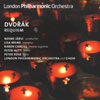Dvorak Requiem
A new Dvorák Requiem goes up against Ancerl’s 50-year-old classic
View record and artist detailsRecord and Artist Details
Label: LPO
Magazine Review Date: 1/2010
Media Format: CD or Download
Media Runtime: 0
Catalogue Number: LPO0042

Author: John Warrack
Others, notably Kertész and Sawallisch, have given smoother performances and been given richer recordings; and this new version from Neeme Järvi, recorded live at the Festival Hall, certainly does more detailed justice to Dvorak’s eloquent orchestration. Not the least of the problems for conductor, soloists and indeed recording engineers is his love of writing for the four soloists as a quartet, for instance in the “Recordare” and the “Pie Jesu”. This is not a work for soloistic egoism, beautifully though Lisa Milne sings in the Gradual and again with the contralto Karen Cargill in the repeated “salva me” at the end of the “Quid sum miser”, as does Peter Rose in the anguished calls of the bass in the “Lacrimosa”.
But this is essentially an ensemble work, and one of Järvi’s strengths lies in allowing the choir to sing with an almost improvisatory fluency, though it is of course the product of a deep understanding and watchful control of Dvorák’s melodic lines. These can be unexpected; the music here sounds natural and always expressive. Järvi makes his points without labouring them. The heavy rhythms of the “Dies irae” are far more telling than over-emphatic thumping; the touch of harshness at the opening of the “Tuba mirum” exactly reflects the intention of the music; in the “Pie Jesu” there is grace and gentleness that never lapses towards sentimentality. Even if there is something grittier and more heartfelt in the old Ancerl version, this new one is no less true to a remarkable setting of the ancient words.
Discover the world's largest classical music catalogue with Presto Music.

Gramophone Digital Club
- Digital Edition
- Digital Archive
- Reviews Database
- Full website access
From £8.75 / month
Subscribe
Gramophone Full Club
- Print Edition
- Digital Edition
- Digital Archive
- Reviews Database
- Full website access
From £11.00 / month
Subscribe
If you are a library, university or other organisation that would be interested in an institutional subscription to Gramophone please click here for further information.




